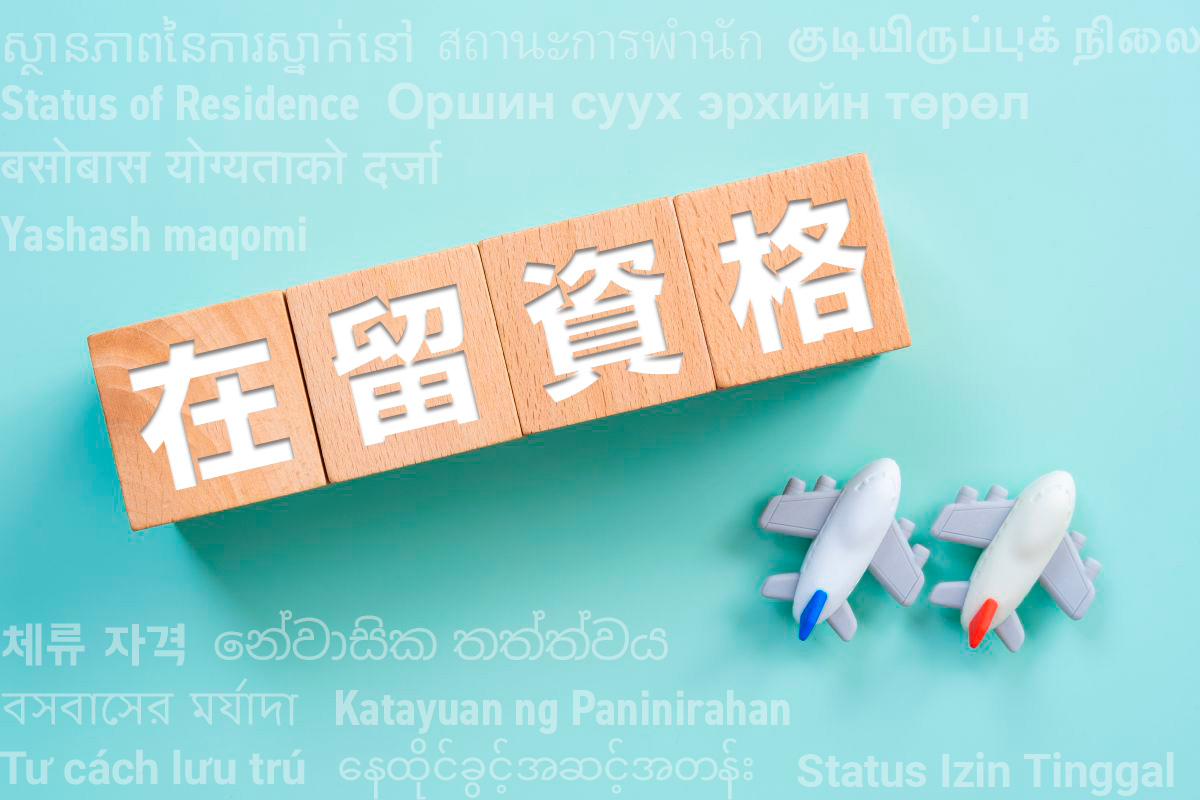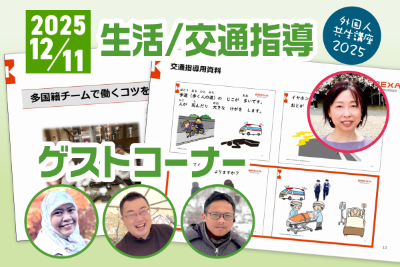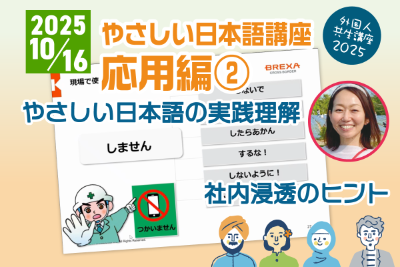- やさしい日本語
- ひらがなをつける
- Language
We provide multilingual content through machine translation. Translation accuracy is not 100%. About the multilingualization of the JAC website
- About JAC
- JAC Membership Information
- Specified Skilled Worker Acceptance
- Specified Skilled Worker Overview of the system
- 10 Mandatory Assistance for Foreigners
- Online individual consultation
- Seminar on Coexistence with Foreign Nationals
- Leading examples of host companies
- Case studies collection "Visionista"
- Foreigner's Voice
- Foreign Resident Acceptance Manual / Q&A
- Useful column "JAC Magazine"
- Acceptance support services
- Specified Skills Acceptance Support Service
- Skills improvement support
- Online Special Education
- Skill training
- Japanese Language Course
- Education and Training Support
- Subsidy system for obtaining qualifications
- Support for creating a comfortable workplace
- Temporary Return Support
- CCUS charge support
- Support system for promoting the accumulation of employment history
- Post-acceptance training
- Compensation system for Specified Skilled Worker (i)
- Daily life support
- Medical interpretation support
- Support for daily life problems
- freeJob matching
- The Specified Skills Evaluation Exam
- Home
- JAC Magazine
- Working with foreign workers
- Can foreigners with "Engineer/Specialist in Humanities/International Services" status of residence be employed in the construction industry?
- Home
- JAC Magazine
- Working with foreign workers
- Can foreigners with "Engineer/Specialist in Humanities/International Services" status of residence be employed in the construction industry?

Can foreigners with "Engineer/Specialist in Humanities/International Services" status of residence be employed in the construction industry?
I wrote the article!

(One company) Japan Association for Construction Human Resources
Chief of Research and Development Department / Administration Department / Public Relations Department
Motoko Kano
(Kano Motoko)

Hello, this is Kano from JAC (Japan Association for Construction Human Resources).
As the labor shortage in the construction industry becomes more serious, the use of foreign human resources is one of the important options.
One of the employment-related status of residence is "Engineer, Humanities, and International Service (Gijinkoku)", but is it possible to hire foreigners with "Engineer, Humanities, and International Services" status of residence in the construction industry?
In this article, we will explain what kind of work applies to the status of residence "Engineer, Humanities, and International Services", whether it can be employed in the construction industry, and points to note when hiring.
What is the "Engineer/Specialist in Humanities/International Services" residence status?
The status of residence "Technical, Humanities, and International Services (Gijinkoku)" is one of the work-related status of residence obtained by foreigners working in Japan.
This qualification is for foreigners who aim to work in Japan with specialized knowledge and skills, and is broadly divided into the following three fields.
- Technical Field: Work that requires knowledge and skills in natural sciences such as physics and engineering
Examples: Engineers, Architects, Civil Engineers, Electrical Engineers, Aerospace Engineers, etc. - Humanities Field: Work that utilizes knowledge of humanities such as law, economics, and sociology
Examples: language teachers, marketing, human resources, sales, etc. - International Business Field: Work that utilizes knowledge of foreign cultures
Examples: interpretation/translation, international trade, public relations, fashion design, etc.
Main requirements for obtaining the status of residence "Engineer/Specialist in Humanities/International Services"
The main requirements for obtaining this certification are as follows:
①Academic background or work experience
Depending on the field, the following educational background and work experience are required:
[Technology/humanities knowledge]
As a general rule, you need a university degree or higher in a related field or at least 10 years of work experience.
[International business]
As a general rule, you need a university degree or higher in a related field, or at least three years of work experience.
②Relevance of work content and expertise
The work you will be doing in Japan must be related to the specialized knowledge and skills you have acquired through your academic background and work experience.
③Other
Common residency screening items such as no past Immigration Control and Refugee Recognition Act violations and a salary level equivalent to Japan are also considered.
These requirements are comprehensively reviewed, so it is important to organize the documents on which to be based and clearly communicate your expertise when applying.
Is it possible to employ foreigners with "Engineer/Specialist in Humanities/International Services" status of residence in the construction industry?

It is also possible to hire foreigners with the status of residence "Technology, Humanities, and International Business (Gijinkoku)" in the construction industry.
This status of residence is for foreigners who are engaged in tasks that require a high level of expertise and skills.
Therefore, even in the construction industry, you can be hired in any job that can make use of your expertise.
Specifically, you can work on the following tasks:
sales
The job involves negotiating with overseas construction companies and material manufacturers, and conducting sales activities with foreign customers, all of which require language skills and international knowledge.
Administration
This applies to tasks such as accounting, human resources, labor, and legal affairs, which are handled by personnel who have acquired specialized knowledge at universities and other institutions.
Each field requires advanced humanities expertise.
management
You can utilize your legal, accounting, and business management expertise in departments such as human resources, finance, legal affairs, and corporate planning.
If you major in one of these fields, it will be more likely to be recognized as relevant to your job.
Construction management
Foreigners who have graduated from a university or vocational school related to architecture or civil engineering can take on tasks such as on-site process management, quality control, and safety management.
However, direct on-site work is not permitted as a general rule.
design
Foreigners who hold a national license as an architect are permitted to use their specialized knowledge to engage in architectural design work.
Interpretation and translation
The job involves tasks that utilize language skills, such as communicating with overseas engineers and translating documents related to overseas construction technology.
Research and Development
You can engage in research and development of new construction techniques and materials.
Overseas trading operations
For construction companies with branches or affiliates overseas, the job involves negotiating with local companies and government agencies, and holding meetings regarding construction contracts.
High level language skills, communication skills, and international knowledge are required.
IT-related
You can hire foreigners with information system knowledge, such as the implementation and operation of BIM (Building Information Modeling) and CIM (Construction Information Modeling), and the development and maintenance of in-house systems.
In this way, foreigners with "Engineer/Specialist in Humanities/International Services" status of residence can be expected to utilize their specialized knowledge and language skills to play an active role in a variety of tasks in the construction industry.
However, it is important to note that this only applies to work that requires specialized knowledge and skills, and simple on-site work is not permitted as a general rule.
The following provides more information about whether on-site work is possible.
You cannot work on construction sites with a "Engineer/Specialist in Humanities/International Services" residence status!
As interest in hiring foreign human resources in the construction industry increases, some companies may want to ask them to work on site with the status of residence of "Engineer, Humanities, and International Business (Gijinkoku)".
However, as a general rule, foreigners with a status of residence in "Technology, Humanities, and International Services" cannot directly engage in on-site work in the construction industry.
The reason is that this status of residence is based on the premise of "engaging in a high level of specialized knowledge, technology, and international work."
Many on-site jobs in the construction industry tend to be less likely to be considered tasks that directly require these expertise and skills.
For example, work such as formwork assembly, rebar placement, and concrete pouring are not subject to "technical, humanities, and international work" because they are mainly judged to be tasks that involve skill and physical strength.
If you want foreigners to work on site in the construction industry, you should consider another status of residence, such as "Specified Skills".
Are there any other residence statuses that allow you to work in the construction industry?
The main status of residence that allows you to work in the construction industry is "Technical, Humanities, and International Business (Gijinkoku)".
Please note that the work that can be engaged in each status of residence is different.
Status of Residence "Specified Skills"
In certain industrial fields where there is a serious labor shortage, there are "Specified Skilled Worker (i)" and "Specified Skilled Worker (ii)" status of residence that allow foreigners with certain skills to work.
Specified Skills is for foreigners who have proven their skill level, such as passing a certain skill test.
In addition, a support system by the host company is also mandatory.
The construction industry is also one of the target fields, and you can engage in a wide range of tasks, including on-site work, in the "civil engineering category", "construction category", and "Infrastructure Facilities and equipment classification".
Civil engineering classification
This includes work related to the construction, maintenance, and repair of civil engineering facilities such as roads, bridges, tunnels, rivers, and ports (Frame working, Reinforcing bar construction, Concrete pressure feeding, Application of construction equipment, earthworks, and other civil engineering projects) and related operations.
Building classification
This includes work related to new construction, extension, renovation, repair, etc. of buildings (Frame working, Plastering, Reinforcing bar construction, interior finishing, roofing, roeing, Carpentry, Building sheet metal work, etc.) and related operations.
Infrastructure Facilities ・Equipment classification
This includes work related to the maintenance, installation, modification, repair, etc. of Infrastructure Facilities and equipment such as telecommunications, gas, water, electricity, etc. (telecommunications, plumbing, Building sheet metal work, heat and cold insulation, etc.) and related operations.
Status of Residence "Technical Intern Training"
This system aims to help foreigners from developing countries acquire advanced skills, technologies, and knowledge in Japan and use them for the economic development of their home countries.
In the construction industry, it is possible to accept Technical Intern Training students in many occupations.
Examples of construction-related occupations include formwork, rebar worker, roe, earthworker, Carpentry, Plastering, plumber, electrical work, construction machinery and construction, painting, Waterproofing, etc.
Technical Intern Training Students are directly involved in practical work in the field to acquire skills centered on on-the-job training (on-the-job training).
However, it is important that it is not simple labor, but rather for skill acquisition.
You may also want to learn more about the difference between Specified Skills and Technical Intern Training.
10 differences between Specified Skills and Technical Intern Training. Know the advantages and precautions before considering them.
Residence status "skilled worker"
This is a status of residence that allows foreigners with outstanding skills to work and utilize their skills.
In the construction industry, the following cases can be considered:
- Foreign architecture: When engaging in the construction or restoration of buildings using traditional architectural styles from one's own country
- Special skills: If you have special construction techniques or skills that are not available in Japan
The "skilled worker" residence status applies to jobs that require special skills and knowledge rather than general construction work.
As such, when hiring foreign workers in the construction industry, it is necessary to select an appropriate status of residence depending on the type of work you want them to do and the skills and experience they possess.
Please also see here for more information on how to accept foreign workers in the construction industry.
Explaining how to accept foreign workers in the construction industry and how to prepare!
Summary: Foreigners with "Engineer/Specialist in Humanities/International Services" residence status can be employed in the construction industry!
Even in the construction industry, you can hire foreigners with a status of residence "Engineer, Humanities, and International Business (Gijinkoku)".
However, this status of residence is intended for foreigners who engage in tasks that require a high level of expertise and skills, so it is important to be careful.
Specifically, you can be hired in positions such as sales, interpreting, and translation that can make use of your expertise.
Since it is not possible to engage them in simple on-site work, it is necessary to hire them under a different status of residence depending on the job.
Other status of residence that can be employed in the construction industry include Specified Skills, Technical Intern Training, and skills.
Each status of residence has different tasks and requirements, so be sure to clarify what kind of work you want them to engage in and consider hiring foreigners with a status of residence that suits your company.
If you are a company that is considering accepting Specified Skilled Worker in the construction industry, please feel free to contact JAC!
*This column is based on information as of April 2025.
The author of this article

(One company) Japan Association for Construction Human Resources
Chief of Research and Development Department / Administration Department / Public Relations Department
Motoko Kano
(Kano Motoko)
Born in Aichi Prefecture.
He is in charge of public relations, research and investigation, and is the person behind social media.
We update our social media accounts daily with the desire to make people fall in love with Japan, to spread the appeal of construction from Japan to the world, and to ensure that Japan's construction industry continues to be the industry of choice around the world.
He is also engaged in research into the feasibility of implementing skills evaluation exam in Asian countries, and is conducting interviews with local organizations in each country.
Related articles

What is the Japanese level of Specified Skilled Worker? Precautions and measures after acceptance

Things to know when working with Muslim employees in a Japanese company

What is the obligation to notify the employment status of foreigners? Foreign workers who must be notified and how to apply

What is the status of residence that allows you to work? Explaining the types, how to obtain it, and more!















